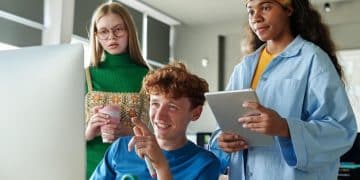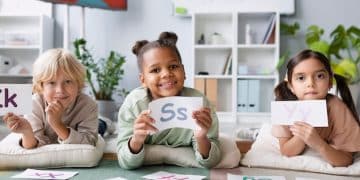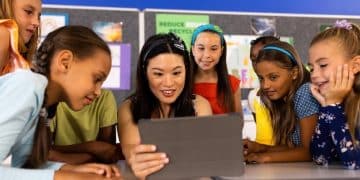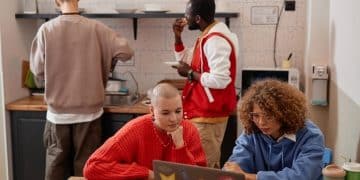The Latest in Early Childhood Education Research: Effective Strategies & Insights
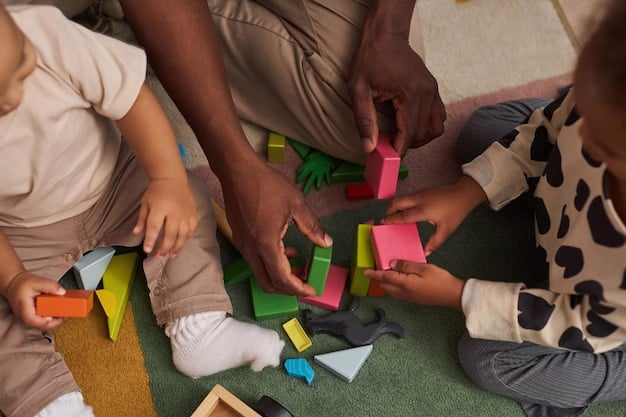
The Latest Research on Early Childhood Education reveals a shift towards personalized learning approaches, highlighting the importance of social-emotional development and play-based learning while addressing the ineffectiveness of rigid, standardized curricula.
The landscape of early childhood education is constantly evolving, shaped by ongoing research and a deeper understanding of how young minds develop. The Latest Research on Early Childhood Education: What Works and What Doesn’t offers valuable insights for educators, parents, and policymakers alike.
Understanding the Foundations of Effective Early Childhood Education
Effective early childhood education lays the groundwork for future academic success and overall well-being. It is predicated on understandings the complex interplay between cognitive, social, and emotional development during these critical formative years.
The Importance of Holistic Development
The most recent studies overwhelmingly emphasize a holistic approach to early childhood education. This approach values all areas of a child’s development equally and acknowledges that pupils don’t absorb knowledge successfully when isolated from social and emotional context.
A holistic method promotes curriculum and teaching strategies that address social skills, emotional control, cognitive capacities, and physical health. The goal is to develop well-rounded people who are prepared to deal with the challenges and possibilities of the future, not just to improve academic results.
- Focus on Social-Emotional Learning (SEL): SEL programs have demonstrated substantial gains in children’s self-awareness, empathy, and relationship skills.
- Integration of Play-Based Learning: Play is not just recreation but a crucial tool for cognitive development, problem-solving, and creativity.
- Emphasis on Family Engagement: Active involvement of parents and families in the learning process significantly enhances a child’s educational outcomes.
In conclusion, understanding the foundation of effective early childhood education requires a holistic approach that values equally all areas of child development, focusing on the development of social skills, emotional control, cognitive abilities and physical health.
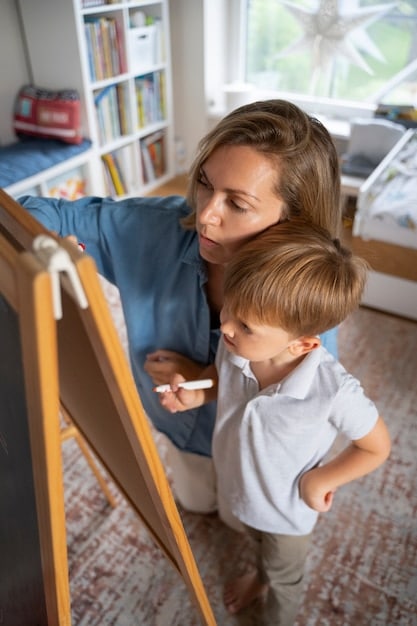
The Power of Play-Based Learning: New Discoveries
Play-based learning has long been recognized as a valuable component of early childhood education, but new research has uncovered even deeper insights into its cognitive and social benefits. By engaging in free play as well as organized activities, children learn essential life skills in a natural, enjoyable way.
Cognitive Benefits of Play
Research reveals that play stimulates cognitive growth by encouraging problem-solving, ingenuity, and abstract reasoning. Children develop their capacity for problem-solving, use their imaginations, and try out new ideas while playing.
Studies demonstrate that play-based learning improves memory, concentration, and executive functioning in addition to fostering creativity. Through cooperative play, educational games, and imaginative activities, children gain the tools they need to succeed both academically and personally.
- Enhanced Problem-Solving Skills: Play provides opportunities for children to tackle challenges and find creative solutions.
- Improved Language Development: Children expand their vocabulary and communication skills through interactive play scenarios.
- Boosted Creativity and Imagination: Play allows children to explore new ideas, roles, and possibilities, fostering a sense of innovation.
In conclusion, the power of play based learning is now recognized to be that of enhancing problem-solving skills, improving language development and boosting creativity and imagination.
Social-Emotional Development: Key Research Findings
Social and emotional development is now regarded as a fundamental component of early childhood education, as it has a substantial impact on a child’s capacity to succeed both in school and in life. Recent studies have shed light on the particular tactics and interventions that are most successful in promoting social and emotional competencies in young children.
The Role of Emotional Regulation
Learning how to regulate one’s emotions is a crucial part of social and emotional development. Children who are able to successfully manage their emotions are more likely to have positive relationships, succeed in school, and have higher levels of overall well-being.
Techniques such as mindfulness exercises, storytelling, and role-playing can help children cultivate emotional regulation skills. Teachers and parents can support children’s emotional growth by providing a safe environment where they can express their sentiments and learn adaptive coping mechanisms.
- Mindfulness Practices: Help children become more aware of their emotions and develop strategies for managing stress and anxiety.
- Positive Reinforcement: Encourage children to exhibit positive behaviors by praising and rewarding their efforts.
- Modeling Empathy: Adults can demonstrate empathy by actively listening to children’s concerns and validating their feelings.
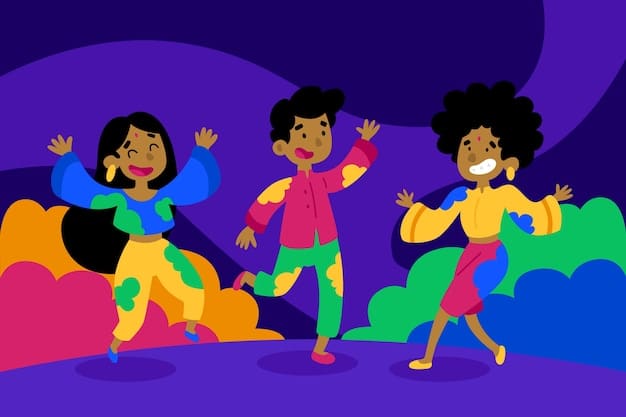
To summarize, some of the key research findings have stated that social emotional development has a substantial impact on a child’s capacity to succeed both in school and in life.
Effective Teaching Strategies for Diverse Learners
With classrooms becoming increasingly diverse, educators need to adopt teaching strategies that cater to the unique needs of all learners. Research highlights the importance of personalized learning approaches and culturally responsive teaching methods in promoting inclusivity and academic success.
personalized Learning Techniques
Custom-made learning enables teachers to customize their instruction to meet the various learning styles, capabilities, and interests of their students. Through the use of differentiated instruction, adaptive technology, and individualized learning goals, teachers can foster engagement and optimize the educational outcomes of each student.
Studies show that personalized learning leads to greater academic achievement, improved motivation, and a stronger sense of ownership over learning. By giving pupils agency over their education, educators can foster a passion for lifelong learning.
Culturally sensitive education acknowledges and values students’ different cultural backgrounds. In order to foster inclusion and respect, teachers can incorporate culturally appropriate resources, examples, and teaching strategies into their lessons.
- Differentiated Instruction: Adapting instructional methods and materials to meet the individual needs of students.
- Adaptive Technologies: Using technology to provide personalized learning experiences based on student performance and progress.
- Culturally Responsive Teaching: Integrating students’ cultural backgrounds and experiences into the curriculum.
In conclusion, with classrooms becoming increasingly diverse, educators need to adopt teaching strategies that cater to the unique needs of all learners.
Addressing the Ineffectiveness of Standardized Curricula
The emphasis on standardized curricula in early childhood education has come under increasing scrutiny, with studies suggesting that rigid, one-size-fits-all approaches can hinder children’s natural curiosity and creativity. Research supports the adoption of more flexible, child-centered curricula that prioritize exploration, discovery, and individualized learning.
The Limitations of Rote Learning
Rote learning, which involves memorizing facts and procedures without understanding their underlying concepts, has been shown to be ineffective in promoting deep learning and critical thinking. Children may be able to recall information in the short term, but they often struggle to apply it in new situations.
Instead, educators are encouraged to create learning experiences that promote active engagement, hands-on exploration, and meaningful connections to real-world contexts. By fostering a love of learning and curiosity, teachers can empower children to become lifelong learners.
Studies show that student engagement and achievement are improved when learning is relevant and meaningful. Teachers can promote student agency and ownership of their learning by giving them the chance to ask questions, investigate subjects of interest, and collaborate with peers.
- Focus on Conceptual Understanding: Prioritizing deep understanding of concepts over rote memorization of facts.
- Hands-On Learning: Providing opportunities for children to explore and manipulate materials, conduct experiments, and engage in real-world problem-solving.
- Project-Based Learning: Engaging students in extended, inquiry-based projects that allow them to explore topics in depth and apply their knowledge and skills in meaningful contexts.
In conclusion, addressing the ineffectiveness of standardized curricula involves the emphasis put on standardized curricula in early childhood education.
The Role of Technology in Early Childhood Education
Technology can be a useful tool for boosting learning outcomes and improving educational experiences for young children, but only when used thoughtfully and intentionally. Research indicates that digital tools should be integrated into early childhood education in a way that promotes play, investigation, and social interaction rather than merely replacing conventional teaching approaches.
Benefits of Educational Apps and Software
Educational apps and software can provide children with access to a wide range of learning opportunities and resources. From interactive storybooks to math games, these tools can help children develop essential skills in a fun and engaging way.
However, it is essential to select digital tools that are age-appropriate, aligned with learning goals, and designed to promote active engagement rather than passive consumption. Educators should also provide guidance and support to help children navigate digital content safely and responsibly.
Current studies emphasize the necessity of finding a balance between face-to-face interactions and screen time in early childhood education. Technology should be used to improve children’s learning experiences and support social and emotional development, not to take the place of interactions and play with people.
- Interactive Learning Games: Games that promote problem-solving, critical thinking, and creativity.
- Digital Storytelling: Using digital tools to create and share stories, fostering language development and imagination.
- Virtual Field Trips: Providing children with opportunities to explore new places and cultures through virtual experiences.
| Key Point | Brief Description |
|---|---|
| 🎉 Holistic Development | Values cognitive, social, emotional, and physical growth equally. |
| 🧩 Play-Based Learning | Enhances problem-solving, language skills, and creativity through play. |
| 💖 Social-Emotional Skills | Focuses on emotional regulation and empathy. |
| 🍎 Diverse Teaching | Uses tailored techniques that are inclusive. |
FAQ
▼
Holistic development emphasizes the equal importance of cognitive, social, emotional, and physical growth in a child’s early years, creating a well-rounded foundation.
▼
Play-based learning enhances problem-solving skills, improves language development, and boosts creativity and imagination.
▼
It enables children to manage their emotions, develop empathy, and form relationships, contributing to higher well-being.
▼
Teachers can customize their instruction to meet various learning styles, capabilities, and interests of their students with personalized learning. By giving agency over their education, educators can foster a passion for learning.
▼
Educators can adopt teaching strategies that cater to the unique needs of all learners, such as personalized learning approaches and culturally responsive teaching methods.
Conclusion
In conclusion, recent studies in early childhood education have offered insightful information on efficient teaching methods and the significance of all-encompassing child development. Teachers can create inclusive, engaging learning environments that set the stage for children to succeed in school and in life by putting these findings into practice.
